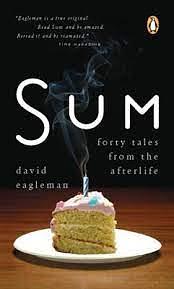Take a photo of a barcode or cover
challenging
mysterious
reflective
slow-paced
Plot or Character Driven:
Plot
Strong character development:
No
Loveable characters:
Complicated
Diverse cast of characters:
Complicated
Flaws of characters a main focus:
No
adventurous
emotional
reflective
fast-paced
Plot or Character Driven:
N/A
Strong character development:
N/A
Loveable characters:
N/A
Diverse cast of characters:
N/A
Flaws of characters a main focus:
N/A
Some repetitive and boring stories, but some really good ones, too.
This is an odd book written by a neuroscientist who is also a writer. The first few chapters absorbed me and I felt such a connection to what was written, they left me wanting to read more...then....the chapters became strange, hard to decipher, I quickly lost interest in the immediate chapter and went to the next. All-in-all very interesting, I just thought the first few chapters far superior to the others.
Fascinating and fun read, with stories that range from thought-provoking to silly to truly disturbing.
I liked this well enough-- forty short alternate versions of what happens to us when we die. It's sort of like _You're an Animal, Viskovitz_ in the sense that is works through ringing all these different possible bells. But I think there's something of a lack of variety in terms of technique-- Eagleman's writing is clear, but never really luminous or literary. The result is that he has only a couple ways to go, and most of the short pieces end in a kind of recognition that we'd call situation irony. I think this is a perfectly valid strategy, given the subject matter. But it's the only string that gets played, and I felt like I wanted more, more possibilities for different kinds of endings, and stories overall.
Also strange: Eagleman is a neuroscientist, but no story talks about what actually happens, from the POV of neuroscience when we die. By the end, I thought, maybe that's a perspective I'll get here, because it must be interesting. But no. And a strangely large number of these bits deal with all of us being some version of a giant computer, working together as a species to accomplish some task for our creator(s). I'm not sure what to make of that, but it seems very contemporary a theme to plumb repeatedly.
Also strange: Eagleman is a neuroscientist, but no story talks about what actually happens, from the POV of neuroscience when we die. By the end, I thought, maybe that's a perspective I'll get here, because it must be interesting. But no. And a strangely large number of these bits deal with all of us being some version of a giant computer, working together as a species to accomplish some task for our creator(s). I'm not sure what to make of that, but it seems very contemporary a theme to plumb repeatedly.
There were 40 stories in this collection and I found about 5 of them to be great with clever and fascinating ideas. The rest was a bit repetetive.
A delightful collection of forty possibilities of the afterlife. All of them are interesting to contemplate. The fact of the matter is, none of us should claim to know what the afterlife would be like, what God is like. We all know the clichés... palaces of gold and pearly gates. You won't find that here. Instead, you find forty unique stories of possible afterlives. Each of them makes sense in their own way. If there is a system and order to that system, you might see how the afterlife would look like ____.
It's a short read (in my case, listen as this was read to me as a book on tape by such wonderful readers as Gillian Anderson, Nick Cave, Steven Fry, and Emily Blunt). Worth it if only to ponder "what if" for a few minutes.
It's a short read (in my case, listen as this was read to me as a book on tape by such wonderful readers as Gillian Anderson, Nick Cave, Steven Fry, and Emily Blunt). Worth it if only to ponder "what if" for a few minutes.
Change of pace for me. A great suggestion from an even better friend. It's a collection of short stories mostly about many possible ways to view life after we are gone & a few just about how we view it in general as it relates to us & what we may believe. Each one is unique in their own way & highlights various dilemmas or questions we may have as humans, what it means to be so & how we view existence, choice & consequences in general. Some favorites of mine were "Egalitaire", "Prism", "Pantheon", "Seed", "Blueprints", "Search" & "Reversal". "Reversal" as the closer was an excellent choice because of how it ends &, to me, it's a statement of how we go through life & this search for understanding.
Only 110 pages, it's a good book for mini though - experiments is a good way to put them. If you like things that make you ponder about life & existence, it's a great choice!
Only 110 pages, it's a good book for mini though - experiments is a good way to put them. If you like things that make you ponder about life & existence, it's a great choice!
This was a strange but delightful find. It's a collection of stories about what an "afterlife" might look like our be like. I recommend the audiobook. Each story is super short and read by a different narrator, one flowing into the other. The whole book is done before you know it. It gives you something restful to think about when you're trying to get to sleep.

